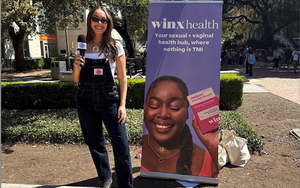
“More than 50% of people think the morning-after pill is
illegal,” Winx Health co-founder Jamie Norwood tells Pharma & Health Insider. “They think it's the same as the abortion pill.”
“Our products are legal in all
50 states, no age restrictions, no parental consent,” Norwood continues, calling the company’s Restart brand a contraceptive that “prevents pregnancy before it happens.”
No wonder Winx concentrates much of its marketing efforts on consumer education.
“Education is super-critical to our mission,” Norwood states.
So, when Winx came to
Austin for South by Southwest last month, it headed for the University of Texas campus -- in a state where abstinence is taught to public school students as their sex education. In an on-campus
activation involving essentially a sign, a megaphone and filming for posting on TikTok, Winx interacted with nearly
1,000 students, giving more than 350 women morning-after pills, along with facts about the treatment.
advertisement
advertisement
“One of the pieces of feedback we got,” Norwood says, “was people saying
‘Oh my God, can I get this? Don't I need a prescription for this? Isn't this illegal?’”
She adds, “It was a zero-dollar campaign. It wasn’t big or flashy.”
But brand impressions grew and Winx says 17% of those 1,000 students “were converted to social followers, subscribers and even customers.”
In the past, Norwood says, Winx has run
billboards on or near college campuses in red states without seeing “any direct impact on the business. But this real-life activation on the ground saw a big lift.”
That echoed the
success seen after pop-up activations last year at the Democratic National Convention in August (a 300% increase in social engagement) and then after the presidential election in November, when
Restart sales skyrocketed some 1000% versus the preceding week.
“Our audience is really resonating with that direct connection and with us taking a stance politically,” Norwood
explains. “After Trump got elected, a lot of people were very scared. They wanted to know that people are fighting for them and showing up with the products they need.”
Winx, which
launched in 2019 with an at-home pregnancy test and then expanded to products for such conditions as urinary tract infections and vaginal infections, only became political after the 2022 Supreme Court
Dobbs decision overturned Roe v. Wade --the same week the company launched Restart.
The timing was no coincidence, Norwood concedes. “The morning-after pill was always on our roadmap. We
were following the court very closely. We knew they going to be voting on the Dobbs decision in June, so we fast-tracked it. We were like, let’s get this product out right when people need it.
It was such a pivotal moment for education.”
Winx revenue grew 69% following the Dobbs case.
“We had never publicly taken a stand, because we didn't want to alienate
anyone,” Norwood says, but “when Roe was overturned, we were left with no choice. We had to say something. It’s not just politics, it’s about our bodies. The majority of women
in this country, regardless of political affiliation, support bodily autonomy. We didn't choose for our bodies to become political. This was chosen for us.”
The decision to go political
“has been huge for not just our community, but our business,” Norwood notes. “We have more loyal customers. Our sales increased so much. It’s not something you typically see
for-profit brands doing.”
Neither is the company’s active distribution of free product.
With a price of just under $50 per pill, Norwood says the company is committed to
donations. “We’ve donated over 36,000 doses of emergency contraception,” she says. “We also have a donation bank where anyone can order one for free, no questions asked. And on
the flip side, anyone can donate a dose.”
Winx used to be called Stix, changing its name a year ago to convey “a wink or a nudge to women that we’re in their corner,”
Norwood says. “We understand what they’re going through. It was also better for retail shelves, which is we’re where heading.”
After starting out as strictly D2C, Winx
has been expanding its distribution. The only brick-and-mortar sales are currently through Giant stores in three states, but Norwood says the brand is working toward getting retail distribution in all
50 states.
That includes one of the biggest sales channels, now in 35 states: on-demand delivery services like Doordash and GoPuff. “You can order our products from your phone and they
come literally in about 15 minutes.” Norwood explains. “It’s great for college campuses and it’s one of our biggest channels. We want to be anywhere the women shop and anywhere
that women need these products.”
Also last year, Kerry Washington came on board as an investor and advisor, and Norwood says the actress remains active as a brand messenger on social
media.
You can expect Winx’s emphasis on grassroots marketing to continue.
“Being scrappy has been such a win,” Norwood says. “We’re not really in a
position to be spending tens of thousands, or hundreds of thousands of dollars, on brand campaigns. Just showing up in person has been huge.”
And she has some advice for other
brands.
“If your brand is political in any way, and a lot of brands are, if you think about environmental justice, reproductive justice, education, showing up and being political can be
good for your bottom line,” Norwood declares. “It will help you attract the right customer and really connect.”
Winx’s political content, such as this still-pinned post from last summer showing two women crying over the prospect of another Trump presidency, has become some
of its most engaged-with content, the brand says.